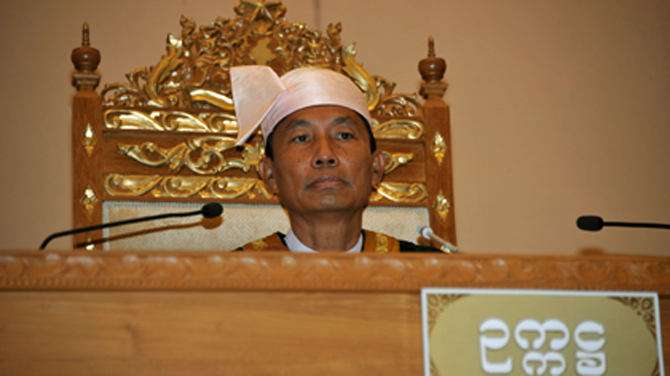RANGOON — Lower House Speaker Shwe Mann will take over the position of Union Parliament speaker from Khin Aung Mying, the Upper House Speaker, on August 1, lawmakers in Naypyidaw said.
The Union Parliament speaker represents the two chambers of Burma’s legislature, the upper and the lower house. The position, which holds great political power, is rotated between the speakers of the two chambers every two and a half years.
“As Parliament came into operation on January 31, 2011, Khin Aung Myint’s period as the Union Parliament Speaker ends on July 31, 2013. Shwe Mann will take over this position on August 1,” said Kyi Myint, a lawmaker with the National Democratic Force (NDF), a small opposition party.
Shwe Mann chairs the ruling Union Solidarity and Development Party (USDP), which comprises members of Burma’s former military regime. Khin Aung Mying is also USDP member.
Shwe Mann will stay on as Union Parliament Speaker until the 2015 elections. The USDP chairman has said recently that he wants to run for president in the election, which is supposed to be Burma’s first free and fair vote in decades.
Shwe Man was the third most powerful general in Burma’s former military junta, after Senior General Than Shwe and Vice-Senior-General Maung Aye.
NDF lawmaker Phone Myint Aung said Shwe Mann would have to prove his political talents in the new position if he wanted to convince the Burmese public that he would make a good future leader for the country.
“Shwe Man, who expressed his desire to be president, needs to concentrate on reforms while he is Union Parliament Speaker. He must try hard in order to show that he is a real leader who is supported not only by the public, but also by the military,” Phone Myint Aung said.
“How much he can persuade and exhort others to amend the Constitution will be very crucial for the 2015 election,” he added.
The Constitution, drafted by the junta in 2008, has numerous undemocratic provisions that gives sweeping powers to the military and puts Burma’s conflict-ridden ethnic regions under strict control of the central government. It also prevents opposition leader Aung San Suu Kyi from becoming president as she was married to a foreigner.
Suu Kyi has said she wants to work with the ruling USDP and the military to amend the Constitution. USDP members have said they are willing to consider constitutional amendments.
Burma’s ethnic rebel groups are demanding amendments that would give their regions greater political autonomy. Naypyidaw has told the rebels during the ongoing peace talks that only Parliament can address such political demands.
Phone Myint Aung said Shwe Mann would face a complex task of resolving the issues related to the peace process in Parliament.
“After getting cease-fire agreements with different armed groups of ethnic minorities, political dialogue will follow. The government has nothing to do with political dialogue, only the Parliament,” the lawmaker said.
“As the parliament has to hold political dialogue, the roles of the Union Parliament Speaker Shwe Man and also that of Aung San Su Kyi will be very important,” he said.
Dr Yan Myo Thein, a Rangoon-based political commentator, said that it remained to be seen whether Shwe Mann would be a force for constitutional change and reform in his new role of Union Parliament Speaker.
“I don’t presume like it is 100 percent sure that there will be reforms in the Parliament after Shwe Mann becomes Union Parliament Speaker. Besides, I foresee just very little scope for constitutional change in Parliament,” he said.

















